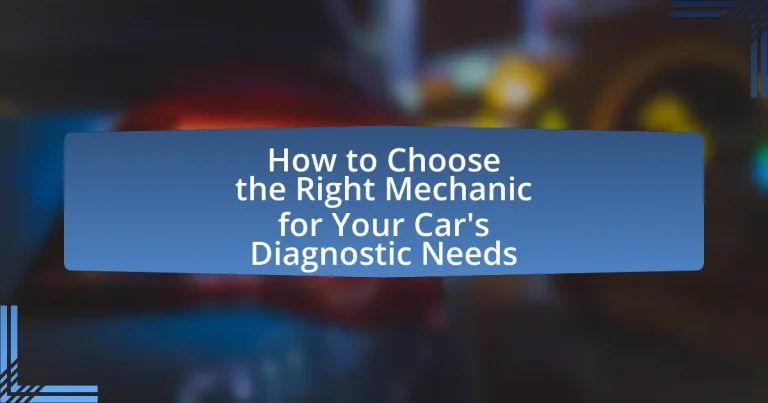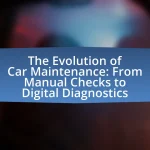The article focuses on selecting the right mechanic for your car’s diagnostic needs, emphasizing the importance of qualifications, experience, and reputation. Key considerations include verifying certifications such as ASE, assessing customer reviews, and understanding the diagnostic tools used by the mechanic. The article also highlights the significance of effective communication, the role of diagnostic fees, and how to recognize signs that your vehicle requires diagnostic services. Additionally, it provides practical tips for evaluating mechanics and ensuring value for money in automotive diagnostics.
What Should You Consider When Choosing a Mechanic for Your Car’s Diagnostic Needs?
When choosing a mechanic for your car’s diagnostic needs, consider their qualifications and experience in automotive diagnostics. A qualified mechanic should have certifications, such as ASE (Automotive Service Excellence), which indicates they have met specific industry standards. Additionally, experience with your vehicle’s make and model is crucial, as it ensures familiarity with common issues and diagnostic procedures. Customer reviews and testimonials can provide insight into the mechanic’s reliability and service quality, further validating their expertise. Lastly, inquire about the diagnostic tools and technology they use, as modern vehicles often require advanced equipment for accurate diagnostics.
How Do You Identify a Qualified Mechanic?
To identify a qualified mechanic, check for certifications such as ASE (Automotive Service Excellence) which indicates professional competence. A qualified mechanic typically has relevant experience, positive customer reviews, and a transparent approach to pricing and services. According to the National Institute for Automotive Service Excellence, mechanics with ASE certification have passed rigorous testing and have at least two years of hands-on experience, ensuring they possess the necessary skills and knowledge to perform automotive repairs effectively.
What Certifications Should a Mechanic Have?
A mechanic should have certifications such as ASE (Automotive Service Excellence) certification, which demonstrates proficiency in various automotive repair areas. ASE certification is widely recognized in the industry and requires passing rigorous exams to validate a mechanic’s skills and knowledge. Additionally, mechanics may benefit from manufacturer-specific certifications, which indicate specialized training in particular vehicle brands, enhancing their expertise in diagnosing and repairing those models. These certifications ensure that mechanics are equipped with the latest industry standards and practices, ultimately leading to better service quality for customers.
How Can You Verify a Mechanic’s Experience?
To verify a mechanic’s experience, you can check their certifications, reviews, and work history. Certifications from recognized organizations, such as the National Institute for Automotive Service Excellence (ASE), indicate a mechanic has met industry standards. Additionally, reading customer reviews on platforms like Yelp or Google can provide insights into their reliability and skill level. Finally, asking for a detailed work history, including years of experience and types of vehicles serviced, can further confirm their expertise in handling specific diagnostic needs.
What Role Does Reputation Play in Selecting a Mechanic?
Reputation plays a critical role in selecting a mechanic, as it directly influences trust and perceived quality of service. A mechanic with a strong reputation is often associated with reliability, expertise, and customer satisfaction, which can be verified through online reviews, ratings, and word-of-mouth recommendations. For instance, a study by the Automotive Service Association found that 70% of consumers rely on online reviews when choosing a service provider, highlighting the importance of reputation in decision-making. Thus, a mechanic’s reputation serves as a key indicator of their ability to meet diagnostic needs effectively.
How Can Online Reviews Influence Your Decision?
Online reviews significantly influence your decision by providing insights into the experiences of previous customers with a mechanic. These reviews often highlight the quality of service, reliability, and pricing, which can guide potential customers in assessing whether a mechanic meets their needs. According to a survey by BrightLocal, 91% of consumers read online reviews, and 84% trust them as much as personal recommendations. This data underscores the importance of online reviews in shaping consumer perceptions and choices when selecting a mechanic for car diagnostics.
What Should You Ask for References from a Mechanic?
When asking for references from a mechanic, you should request contact information for previous clients who had similar services performed. This allows you to verify the mechanic’s expertise and customer satisfaction. Additionally, inquire about the types of repairs or services the mechanic has completed for those references, as this will provide insight into their specific skills and reliability. Checking online reviews and ratings on platforms like Yelp or Google can also serve as proof of the mechanic’s reputation and quality of work.
How Important is Communication with Your Mechanic?
Communication with your mechanic is crucial for ensuring effective vehicle maintenance and repair. Clear dialogue allows for accurate diagnosis of issues, as mechanics rely on detailed descriptions of symptoms from car owners. According to a study published in the Journal of Automotive Technology, effective communication can reduce misdiagnosis rates by up to 30%, leading to more efficient repairs and cost savings for the customer. Furthermore, open communication fosters trust, enabling mechanics to provide tailored advice and recommendations based on the owner’s specific needs and driving habits.
What Questions Should You Ask During Your Initial Consultation?
During your initial consultation with a mechanic, you should ask about their experience and qualifications, specifically how long they have been in the industry and if they have certifications relevant to your vehicle type. This inquiry is crucial because a mechanic’s experience directly impacts their ability to diagnose and repair issues effectively. Additionally, ask about their diagnostic process, including the tools and technology they use, as this will give you insight into their approach and whether it aligns with modern standards. Inquire about warranty policies on repairs and parts, as reputable mechanics typically offer guarantees, which indicates confidence in their work. Lastly, request references or reviews from previous customers to assess their reputation and reliability. These questions collectively ensure that you choose a mechanic who is knowledgeable, trustworthy, and capable of meeting your car’s diagnostic needs.
How Can You Assess a Mechanic’s Willingness to Explain Issues?
To assess a mechanic’s willingness to explain issues, observe their communication style during initial interactions. A mechanic who is open to explaining problems will take the time to answer questions clearly and provide detailed descriptions of the issues and necessary repairs. For instance, if a mechanic uses layman’s terms and encourages you to ask follow-up questions, it indicates a willingness to engage and educate. Additionally, reviews and testimonials from previous customers can serve as proof of a mechanic’s communicative approach, highlighting their ability to explain technical matters effectively.
What Diagnostic Tools and Technologies Should a Mechanic Use?
A mechanic should use diagnostic tools such as OBD-II scanners, multimeters, and oscilloscopes. OBD-II scanners are essential for reading error codes from a vehicle’s onboard computer, allowing mechanics to identify issues quickly. Multimeters are used to measure electrical parameters, helping diagnose electrical system problems. Oscilloscopes provide visual representations of electrical signals, which can be crucial for diagnosing complex issues in modern vehicles. These tools are widely recognized in the automotive industry for their effectiveness in diagnosing vehicle problems accurately and efficiently.
How Do Modern Diagnostic Tools Improve Accuracy?
Modern diagnostic tools improve accuracy by utilizing advanced technologies such as computer algorithms, sensors, and data analytics to identify vehicle issues more precisely. These tools, including OBD-II scanners and diagnostic software, analyze real-time data from various vehicle systems, allowing mechanics to detect problems that may not be visible through traditional methods. For instance, studies show that using these tools can reduce diagnostic errors by up to 30%, leading to more effective repairs and enhanced vehicle performance.
What Are Common Diagnostic Tools Used by Mechanics?
Common diagnostic tools used by mechanics include OBD-II scanners, multimeters, and pressure gauges. OBD-II scanners are essential for reading error codes from a vehicle’s onboard computer, allowing mechanics to identify issues related to the engine, transmission, and other systems. Multimeters are utilized to measure voltage, current, and resistance, which helps in diagnosing electrical problems. Pressure gauges are important for assessing fluid pressures in systems like fuel and oil, providing insights into potential malfunctions. These tools are widely recognized in the automotive industry for their effectiveness in diagnosing vehicle issues accurately.

How Can You Evaluate the Cost of Diagnostic Services?
To evaluate the cost of diagnostic services, compare the prices of various mechanics and consider the complexity of the diagnostic tests required. Research indicates that diagnostic fees can range from $50 to $150, depending on the service provider and the specific tests performed. Additionally, check for any hidden fees associated with the diagnostic process, such as labor costs or additional charges for parts. By obtaining quotes from multiple mechanics and reviewing their reputations, you can make an informed decision that balances cost with quality service.
What Factors Influence the Cost of Car Diagnostics?
The cost of car diagnostics is influenced by several key factors, including the type of diagnostic equipment used, the complexity of the vehicle’s systems, labor rates in the region, and the mechanic’s expertise. Advanced diagnostic tools, such as computer scanners, can increase costs due to their high price and the training required to operate them effectively. Additionally, vehicles with more complex electronic systems may require more time and specialized knowledge to diagnose issues, leading to higher labor costs. Regional labor rates vary significantly; for example, urban areas typically have higher rates compared to rural locations. Finally, mechanics with more experience or specialized certifications may charge more for their services, reflecting their advanced skills and knowledge in diagnosing car problems accurately.
How Do Labor Rates Vary Between Different Mechanics?
Labor rates vary significantly between different mechanics due to factors such as geographic location, mechanic experience, and the type of service provided. For instance, mechanics in urban areas typically charge higher rates compared to those in rural regions, reflecting the cost of living and demand for services. Additionally, experienced mechanics or those with specialized skills often command higher labor rates, as they bring expertise that can lead to more efficient and effective repairs. According to the Bureau of Labor Statistics, the average hourly wage for automotive service technicians and mechanics in the United States was approximately $23.00 in 2021, but this can range from $15.00 to over $40.00 per hour based on the aforementioned factors.
What Should You Know About Diagnostic Fees?
Diagnostic fees are charges that mechanics impose for assessing vehicle issues. These fees typically cover the time and expertise required to diagnose problems accurately, which can range from $50 to $150 or more, depending on the complexity of the issue and the shop’s location. Understanding that diagnostic fees are often separate from repair costs is crucial, as they reflect the labor involved in identifying the root cause of a vehicle’s malfunction. Additionally, some shops may apply the diagnostic fee toward the cost of repairs if the customer proceeds with the service, making it essential to inquire about this policy before authorizing any work.
How Can You Compare Quotes from Different Mechanics?
To compare quotes from different mechanics, gather detailed estimates that include labor costs, parts, and any additional fees. This allows for a direct comparison of the total costs involved in the service. Ensure that each quote outlines the same services and parts to maintain consistency. According to a 2021 survey by AAA, 70% of consumers reported that they compare prices before choosing a mechanic, highlighting the importance of transparency in quotes. By analyzing these estimates side by side, you can identify the most cost-effective option while ensuring that the quality of service remains consistent.
What Should You Look for in a Detailed Estimate?
In a detailed estimate, you should look for a clear breakdown of costs, including parts, labor, and any additional fees. This transparency allows you to understand how the total price is calculated and ensures that there are no hidden charges. Additionally, the estimate should specify the services to be performed, the estimated time for completion, and the warranty information for parts and labor. This level of detail not only helps in comparing estimates from different mechanics but also provides assurance of the quality and scope of the work to be done.
How Can You Ensure You’re Getting Value for Your Money?
To ensure you’re getting value for your money when choosing a mechanic for your car’s diagnostic needs, research and compare prices for similar services across multiple mechanics. This approach allows you to identify average costs and avoid overpaying. According to a 2021 Consumer Reports survey, consumers who obtained estimates from three different mechanics saved an average of 20% on repairs. Additionally, check online reviews and ratings to assess the quality of service provided by each mechanic, as higher-rated mechanics often justify their prices with better service and expertise.

What Are the Signs That You Need a Diagnostic Service?
Signs that you need a diagnostic service include persistent warning lights on your dashboard, unusual noises from the engine, decreased fuel efficiency, and difficulty starting the vehicle. These indicators suggest that there may be underlying issues affecting your car’s performance. For instance, the presence of a check engine light often signifies a problem that requires professional assessment, as studies show that ignoring such warnings can lead to more severe mechanical failures and costly repairs. Additionally, if your vehicle exhibits erratic behavior, such as stalling or poor acceleration, it is crucial to seek diagnostic services to identify and resolve potential issues before they escalate.
How Can You Recognize Common Symptoms of Car Issues?
Common symptoms of car issues can be recognized through specific signs such as unusual noises, warning lights on the dashboard, changes in performance, and fluid leaks. For instance, a grinding noise when braking may indicate worn brake pads, while the illumination of the check engine light often signals a need for diagnostic evaluation. Additionally, a decrease in acceleration or difficulty starting the engine can point to issues with the fuel system or battery. Recognizing these symptoms early can prevent further damage and ensure timely repairs.
What Warning Lights Should You Pay Attention To?
You should pay attention to warning lights such as the check engine light, oil pressure warning light, battery warning light, and brake warning light. The check engine light indicates potential engine issues, which could range from minor to severe problems. The oil pressure warning light signals low oil pressure, which can lead to engine damage if not addressed. The battery warning light suggests electrical system issues, potentially affecting the vehicle’s ability to start. The brake warning light alerts drivers to problems with the braking system, which is critical for safety. Ignoring these warning lights can result in costly repairs and unsafe driving conditions.
How Do Unusual Sounds Indicate a Need for Diagnostics?
Unusual sounds from a vehicle indicate a need for diagnostics because they often signal underlying mechanical issues that require professional assessment. For instance, a grinding noise may suggest brake wear or failure, while a knocking sound could indicate engine problems. These sounds serve as auditory warnings, prompting drivers to seek diagnostic services to prevent further damage. Research shows that early detection of vehicle issues through sound can lead to more cost-effective repairs and enhanced safety, as unresolved problems can escalate into more severe malfunctions.
What Should You Do If You Have a Bad Experience with a Mechanic?
If you have a bad experience with a mechanic, you should first communicate your concerns directly to the mechanic or the shop manager to seek resolution. Clear communication can often lead to a satisfactory outcome, such as a refund or a redo of the service. If the issue remains unresolved, consider documenting your experience, including receipts and any correspondence, and then file a complaint with the Better Business Bureau or your local consumer protection agency. This approach is supported by consumer advocacy groups, which emphasize the importance of documentation in disputes to facilitate resolution.
How Can You Address Poor Service or Misdiagnosis?
To address poor service or misdiagnosis, communicate directly with the mechanic or service provider to express your concerns clearly. This approach allows for immediate clarification and potential resolution of the issue. If the problem persists, consider seeking a second opinion from another qualified mechanic, as this can provide a fresh perspective and confirm or refute the initial diagnosis. According to a study by the Automotive Service Association, obtaining a second opinion can lead to more accurate diagnoses in 30% of cases, highlighting the importance of verifying service quality.
What Steps Can You Take to Find a Better Mechanic?
To find a better mechanic, start by seeking recommendations from trusted sources such as friends, family, or online reviews. Research shows that 70% of consumers trust recommendations from people they know, making personal referrals a reliable method. Next, verify the mechanic’s credentials, including certifications from recognized organizations like the National Institute for Automotive Service Excellence (ASE), which ensures that the mechanic has met industry standards. Additionally, visit the shop to assess cleanliness, organization, and customer service, as these factors often reflect the quality of work. Finally, request estimates for services to compare pricing and transparency, which can indicate the mechanic’s honesty and professionalism.
What Tips Can Help You Choose the Right Mechanic for Your Car’s Diagnostic Needs?
To choose the right mechanic for your car’s diagnostic needs, prioritize mechanics with certifications and positive customer reviews. Certified mechanics, such as those with ASE (Automotive Service Excellence) certification, demonstrate a recognized level of expertise. Additionally, reading reviews on platforms like Google or Yelp can provide insights into customer satisfaction and service quality. A mechanic who specializes in your vehicle’s make and model is also beneficial, as they are likely to have specific knowledge and experience with common issues. Furthermore, obtaining estimates from multiple mechanics can help you gauge fair pricing and service options.
How Can Building a Relationship with Your Mechanic Benefit You?
Building a relationship with your mechanic can lead to better service and trust, resulting in more accurate diagnostics and repairs. When a mechanic knows a customer’s vehicle history and preferences, they can provide tailored advice and prioritize necessary maintenance, which enhances vehicle longevity. Additionally, a strong relationship often results in more transparent communication regarding costs and potential issues, as mechanics are more likely to inform loyal customers about necessary repairs before they become urgent. This trust can also lead to better pricing, as mechanics may offer discounts or prioritize loyal customers during busy times.
What Best Practices Should You Follow When Seeking Diagnostic Services?
When seeking diagnostic services, prioritize selecting a qualified mechanic with relevant certifications and experience. Researching the mechanic’s credentials, such as ASE certification, ensures they possess the necessary skills and knowledge to accurately diagnose vehicle issues. Additionally, reading customer reviews and testimonials can provide insights into the mechanic’s reliability and service quality. It’s also beneficial to request a detailed estimate before any work begins, as this promotes transparency and helps avoid unexpected costs. Following these best practices enhances the likelihood of receiving accurate diagnostics and satisfactory service.


